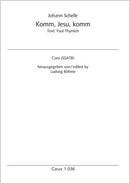| 作曲者 | Johann Schelle (1648-1701)・ヨハン・シェッレ |
| タイトル | Komm, Jesu, komm |
| 出版社 | Carus・カールス |
| 楽器編成 | 混声合唱、アカペラ |
| 楽器編成(詳細) | Coro SSATB |
| 品番 | M007244323 |
| 校訂者 | Ludwig Böhme |
| 言語 | ドイツ語 |
| 形状 | 8 ページ・21 x 29.7 cm・12 g・表紙カバー無し |
| 出版年 | 2019年 |
| 出版番号 | CV 01.036/00 |
| ISMN | 979-0-007-24432-3 |
| サンプル | https://www.carusmedia.com/images-intern/medien/00/0103600/0103600x.pdf |
Johann Schelle was Kantor of St. Thomas’s Leipzig from 1677 until his death in 1701. He received his training under the direction of Heinrich Schütz at the Dresden court. As Kantor, Schelle expanded the repertoire the choir sang in church services with numerous sacred concertos, motets, and cantatas. The motet Komm, Jesu, komm was composed after the death of Jacob Thomasius, professor at Leipzig University and Rector of St. Thomas’s School, and was performed at his funeral ceremony in 1684. The predominantly amiable and song-like character of the intimate five-part setting reflects a baroque attitude to dying and death: dying is not regarded as a painful event, but is longed for expectantly as a release from the earthly and the door to eternal life in paradise. The poem is by Paul Thymich, who also worked at St. Thomas’s School. About half a century later Johann Sebastian Bach took the first and last verses of Thymich’s 11-verse poem and used them as the basis for his double- choir motet Komm, Jesu, komm.



